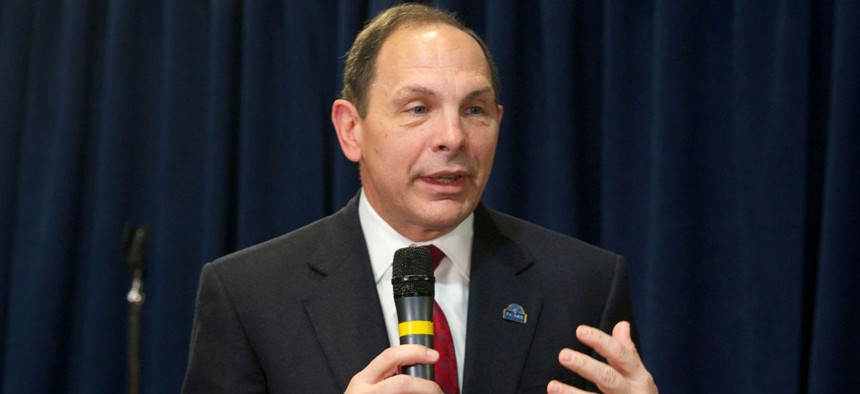
VA Secretary Bob McDonald speaks at a town hall meeting with employees last winter. The union allegedly created a list of executives it wanted McDonald to fire. Michael L. Moore/VA
Senior Execs and Managers Blast Union for ‘Hit List’ of VA Officials to Fire
Congressional panels asked to investigate ‘internal review’ of management.
This story has been updated.
In an unusual split between federal employee advocacy groups, the Senior Executives Association and the Federal Managers Association on Tuesday teamed up to ask several congressional panels to investigate what they called a “hit list” of Veterans Affairs Department managers compiled by a chapter of the American Federation of Government Employees.
SEA President Carol Bonosaro and Federal Managers Association President Patricia Neihaus in their Aug. 18 letter decried the union’s use of official time on an “internal review” to create a list of managers and executives that the union hoped VA Secretary Bob McDonald would fire.
“I am writing to request an inquiry by your committees, either independently or jointly, into a troubling development at the Department of Veterans Affairs that threatens to further destabilize labor-management relations at a department that has faced serious challenges in recent years,” Bonosaro and Neihaus wrote to House Veterans’ Affairs Committee Chairman Jeff Miller, R-Fla.; House Oversight and Government Reform Committee Chairman Jason Chaffetz, R-Utah; Senate Veterans’ Affairs Committee Chairman Johnny Isakson, R-Ga.; and Senate Homeland Security and Governmental Affairs Committee Chairman Ron Johnson, R-Wis.
“Topping the list is whether the “internal review” was developed by union officials on official time,” the letter continued. “As you know, official time provides for federal labor organizations to conduct representational activities. However, to our knowledge, official time does not cover a union investigating agency managers and executives for the purposes of creating a hit list of those it seeks to have removed from the agency.”
The letter was triggered by July reports describing the internal review in The Washington Post and FedSmith, the two presidents wrote. Other questions the actions raised for possible investigation include whether union members are trained in the conduct of an internal review, and whether union members took sworn statements, and whether those interviewed were given a chance to respond.
“Where was the inspector general for all this?” the letter asked. “What law would authorize a private sector entity [AFGE (AFL-CIO)] to use government time and resources to investigate federal employees? AFGE and federal unions fight for the due process and constitutionally guaranteed protections afforded to federal employees – but what of the rights of their fellow employees, the agency managers and executives?”
Many Republican lawmakers have questioned the use of “official time” for union activity, and the letter comes after the House in July passed the VA Accountability Act, which would ease the firing process for all levels of employees at the department rather than just senior executives and require a study of official time.
"I have received the letter and am looking forward to reviewing all the documents in this matter," House Veterans' Affairs Chairman Miller said in a statement. "Official time should be used with great care and this letter raises even more questions about how AFGE is using taxpayer resources. The VA Accountability Act of 2015 would require the GAO to conduct an independent study of VA time, space and resources devoted to labor union activities. This is yet another example of why a third party investigation is needed to find the best practices and the trouble spots in VA's current labor system."
AFGE declined to comment on the allegations. Asked by Government Executive whether the letter is unique or the result of long-standing tensions with unions, Bonosaro said, “I don't consider it a break with the union but a concern with one of its chapters.”
Greg Stanford, director of government and public affairs for the FMA, said, “I don’t think there’s a pattern since this is not something that happens regularly. Management groups do a lot of work with unions as part of Federal Postal Coalition on a vast majority of issues affecting the federal workforce,” he said. “We’re in lockstep on protecting pay and benefits.”







